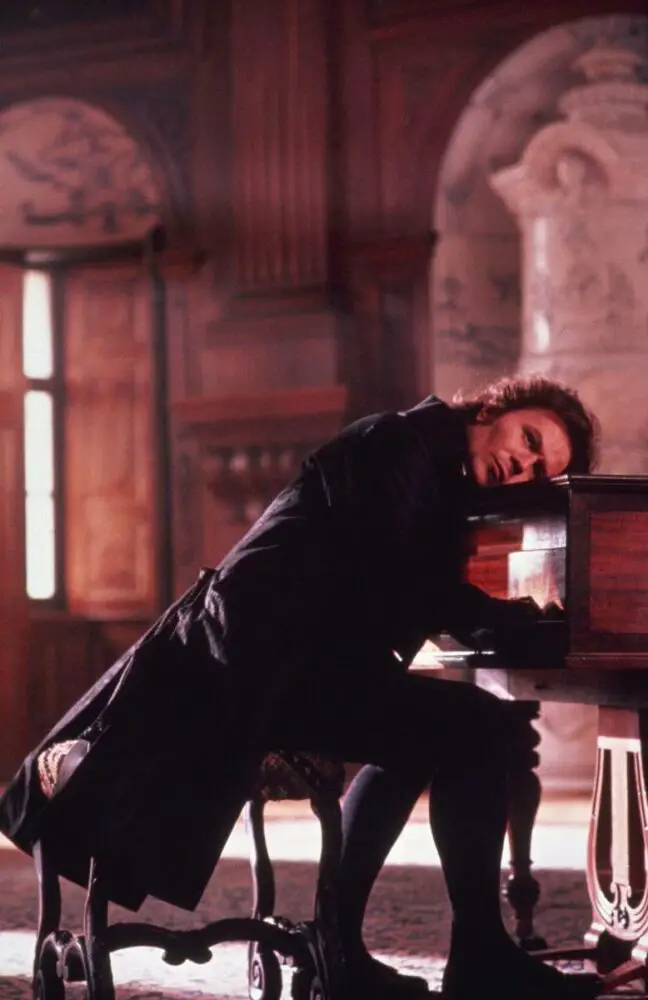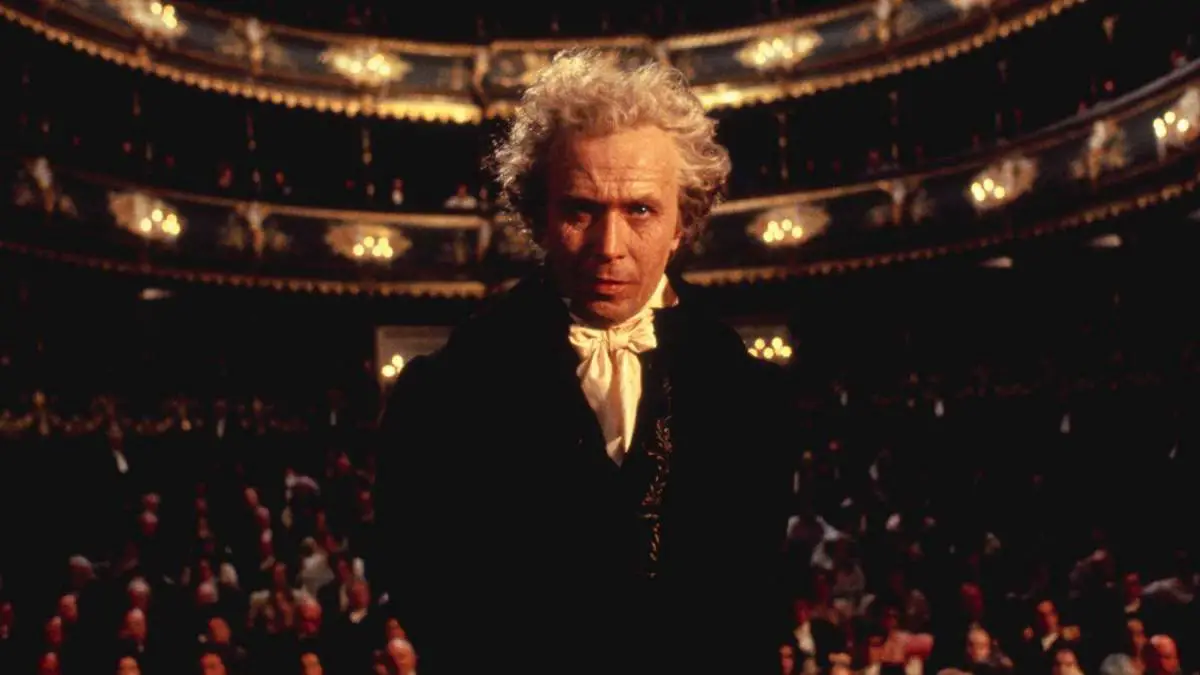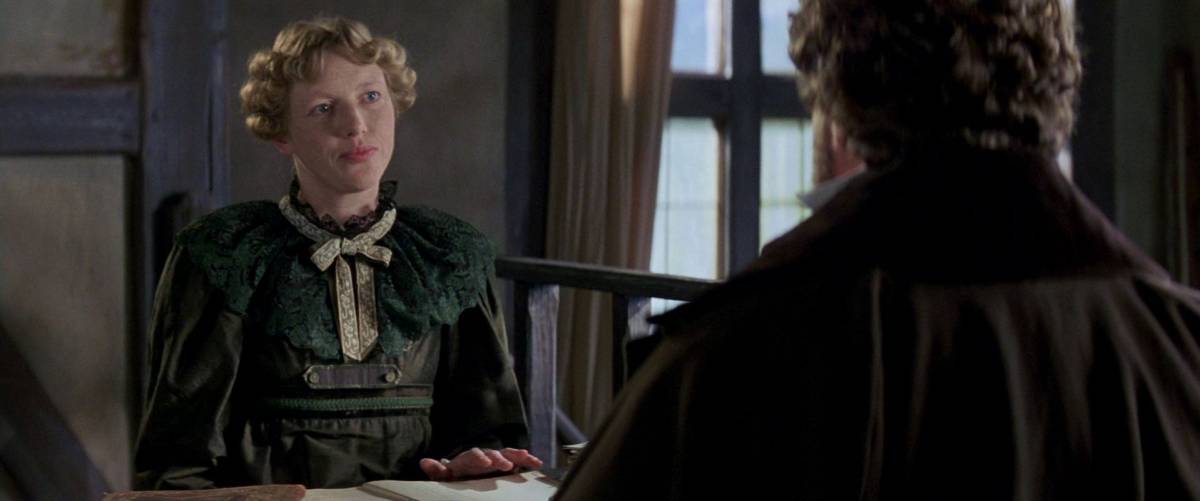My grandmother was a music snob. She went to Juilliard while she was still in high school, and she would have been a concert pianist if women had done that sort of thing in those days. She was that good. So, naturally, when it came to anything related to classical music, I took my advice from her. She was also, however, a bit of a cynic. When she told me that this film about Ludwig van Beethoven was a complete fiction and not a heartbreaking tale of unrequited love, I believed her. I figured Immortal Beloved was comparable to Amadeus—classical music fan-fic—and I looked no further.
Turns out my grandmother wasn’t entirely on the money on this one. Bernard Rose’s film was built around love letters that were found among the composer’s belongings after his death. They addressed an unnamed woman as his “immortal beloved,” and Beethoven historians have speculated about her identity ever since. Rose, who is not any sort of a historian, seemingly turned the real-life letters into fan-fic simply by choosing an identity for the woman and shaping his story from there.
If absolutely nothing else, it is a very pretty film. And it’s got the best soundtrack in the world, Beethoven’s own music (and as a bonus, it’s all in the public domain). The look of the film matches the music—it is lush and vibrant, and so very extra. If you think about it, it’s kind of comparable to Citizen Kane: just replace “Rosebud” with “immortal beloved,” and make the big reveal a woman instead of a sled. A simple and effective plot.

In 1994, Gary Oldman was at the height of his not-technically-handsome-yet-incredibly-sexy hotness. Ludwig van Beethoven, especially within the context of an intense love story, was a perfect role for him and his glorious style of scenery-chewing. The story, set soon after the composer’s death, is told through flashbacks. Oldman plays the character beautifully, from young and handsome to a querulous and awful old man. The flashbacks are framed by the quest to find the woman mentioned in the letter. His assistant, Herr Schindler, has found the letter (it’s one letter in the film, instead of three), and has set himself on a quest to find the appropriate recipient. Jeroen Krabbe (The Fugitive) plays Schindler, and it’s kind of fun to see him not playing the bad guy for once. Herr Schindler is really quite warm and fuzzy. When Schindler first met Beethoven, the composer explained the meaning behind a new sonata, and many years later, it turned out to be reflective of events mentioned in the “immortal beloved” letter.
Beethoven himself may have been a terrible person with a reputation for misogyny and a habit of abusing those close to him (and those not so close), but if Schindler can fulfill his quest and find this woman, it will prove (at least to himself) that the maestro did indeed have a heart. Not going to lie: I was initially a bit disappointed when the immortal beloved turned out to be an actual, quite mortal woman. I think I had been expecting something more ethereal, that he wrote letters to the Muse herself. Or something.

The first two-thirds of the film are essentially about the first two candidates on Schindler’s list (not that Schindler, not that list), and the two that history considers possibilities. The first is Giulietta Guicciardi (Valeria Golino), who knew the composer as a young man and believed herself to be the great love of his life. Already a notorious womanizer, young Beethoven begins as her music teacher and ends up as her lover. The affair lasts until she comes upon an already-deaf Beethoven playing the piano while laying his head against the instrument. He is unable to hear his own music but feels the vibrations within the piano. He can’t hear her when she enters the room, and when he turns and sees her behind him, he is humiliated and enraged. So much for the great love of his life. And no offense to Valeria Golino, but the next woman on the list is Isabella Rossellini, and she is an upgrade from pretty much anyone.
Rossellini plays former noblewoman Anna Marie Erdody. When Schindler tracks her down, she has put the whole aristocratic life behind her and is living a happy, simple life. Over drinks, she tells Schindler her story. Rossellini is glorious in both the present and the past. I think Schindler falls in love with her a little bit, too (who could blame him?), but that’s not really relevant.
The relationship between Beethoven and Anna Marie is easily my favourite thing in the film. It’s just lovely. First of all, Isabella Rossellini is too fabulous to actually exist. Second of all, we actually get to see Beethoven in a healthy, adult relationship. Not that Giulietta was unhealthy, but he’s older when he meets Anna Marie, and the relationship is more mature. She is divorced and living independently with her three small children, and she attends one of his concerts. He is conducting, and the performance falls apart because he can’t hear it. His deafness is communicated to us with a ringing sound that drowns out everything else, and we get to share a little of his frustration and anguish. In moments like this, we are able to feel sympathy for him, despite repeated examples of his terrible personality. When the concerto falls apart, the musicians scoff, and the audience laughs. Anna Marie alone is touched by his plight. She gets up in front of everyone, extends her hand to the distraught maestro and leads him away.
She takes him home, and he lives with her and her family for a year. She says it was the happiest year of her life, and probably his, too. They become lovers, but more importantly, she is his best friend. With her, he doesn’t have to be ashamed of his handicap. When one of her children is killed during Napoleon’s attack on the city, Beethoven comes to her in her grief with a piece of music he has written for her. “You and I speak better in music,” he says. This is the highest compliment a man like him could give to someone else, I think, to consider her a musical equal. When they play the piece together, it is a perfect conversation about her loss and his sadness for her misery.
That attack sequence, by the way, is cinematically gorgeous, and very hard to watch. As tumultuous Beethoven plays, we have to see Anna Marie clutching her frightened children, crouching under the piano as the house shakes from the explosions and gunfire outside. Meanwhile, Giulietta is fleeing the city with an escort that apparently wasn’t armed well enough. Their carriage is waylaid by a group of soldiers who take turns raping Giulietta, finally cutting her throat and leaving her for dead. When speaking to Schindler, all she will say of the scar on her neck is that “there was some unpleasantness.” I don’t know about actual history, but in this story, the women in his life are badass AF.
It turns out that Anna Marie knows perfectly well who Beethoven’s great love is, and she is strong and classy enough to know it isn’t her. She reveals to Schindler that the answer has been in front of them all along.

His brother, Caspar, had long been married to a woman named Johanna, for whom Beethoven harbored a particular hatred. Since the maestro had a reputation for being cruel to both women and family, and held the marriages of both his brothers in disdain, no one had really thought twice about it. His dislike of Johanna even extended to his taking legal action to gain custody of his young nephew, Karl, after Caspar’s death. He cites Johanna as a woman of “low moral character,” and takes the boy away. He refuses to let young Karl even see his mother, for which even Anna Marie berates her former lover. He insists that he is going to train Karl to be a great pianist and seems quite content with his own delusion that the boy he cannot hear has talent. Unfortunately for Karl, this couldn’t be further from the truth. Karl goes so far as to plead with Schindler to convince his uncle that he is a terrible pianist, that he’s terrible at everything, but the maestro refuses to listen. In desperation, Karl tries to kill himself, and he can’t even succeed at that. The bullet only wounds him, and Karl tells his uncle he never wants to see him again. Would Karl have been so terrible at everything if he had been raised by his mother and not his domineering uncle? My guess is no.
If you haven’t figured it out by now, the reason Beethoven hates his brother’s wife so very much is because he actually loves her. Yes, the “immortal beloved” was his brother’s wife. Johanna and Beethoven had been lovers, but he hesitated to marry her because her blood wasn’t quite blue enough. By the time he decides he doesn’t care, that they must wed, a bad turn of fate literally separates the two. Remember the sonata that so moved Herr Schindler? It was about a man trying desperately to reach his lover, only his carriage has broken down in the rain. The sonata is the melody of his frustration and desperation, knowing she is waiting for him but will only wait so long. He never reaches her, nor does the letter he tries to send in his place.
Johanna, pregnant with his child, assumes that this means he doesn’t really love her. In self-preservation, she takes up with his brother so her child will have a father. Did Beethoven know that his nephew was actually his son? Hard to say. She whispers into his ear that she is carrying his child, but it is unclear whether or not he is able to hear her. In the letter, he says, “I can only live with you either completely, or not at all,” which explains why he spent the rest of his life being so cruel to her. And if he can’t have her, he won’t have anyone. The relationship he couldn’t have with her, he tried to force on Karl.

The real Rosebud of this movie, as far as I am concerned, is less about the woman than it is about Beethoven himself. Toward the end of his life, when he is alone and a mess, we get to see the premiere of his Ninth Symphony. And with the famous “Ode To Joy,” we are given more flashbacks—this time to Ludwig van Beethoven as a young boy. Young Ludwig and his brothers are under constant terror of a father who is often drunk and abusive. The beatings Ludwig endures at his father’s hands suggest that they might be responsible for ruining his hearing. In any case, we get to see the childhood that made him into the man he became, and it is heartbreaking. The music of the “Ode To Joy” soars as we watch the boy running from his father, far into the forest, finally taking refuge in a starlit pond. When we see him floating in the black water, under a dazzling sky, the reflection makes it look as if he is floating among the stars themselves. At that moment, he, like his music would do, transcends earth itself and becomes one with the universe. It is a beautiful moment, and, as Johanna says of him, “I could not hate a man who could write such music.”
Back on earth, at the concert, the symphony is over. Beethoven has made his way onto the stage, to the confusion of the musicians. We hear a slight buzz, but Beethoven is gazing at the backdrop behind the singers—a painting of a starry sky, which must have struck a childhood memory for him. Finally, the conductor gently guides the maestro to turn around to face the audience. He looks almost bashful to see the thunderous applause that he cannot hear. He didn’t know that Johanna was in that audience, but after that, he made a point of returning Karl’s custody to her. He needs to make it right with her, as much as he can, before he dies. When she comes to see him, it is close to the end. He writes her a note: “Must it be?” She writes back, “It must be.” She walks away from him, and her only other contact with her great love is a visit to his grave.

So there you have it—fan-fic based on a symphony. I’m nowhere near my grandmother’s league, but I’ve always been a bit of a music nerd, and I do think that it gives you a bit of an edge when it comes to enjoyment of this film. It is lovely to hear the way people talk about music (his in particular), the reverence with which they speak of it. Do people still feel this way about music? Are we too jaded and cynical for something like the “Ode To Joy” to be able to change our lives? I don’t know. And would the art have been the same if Beethoven had actually spent his life with his love and not had quite so much angst to pour into his work? I never discussed that with my grandmother, any more than I told her that Billy Joel stuck Beethoven’s “Appassionata” into one of his own songs (he gives credit, but still). Like the identity of Beethoven’s immortal beloved, some things are perhaps best left unconfirmed.



